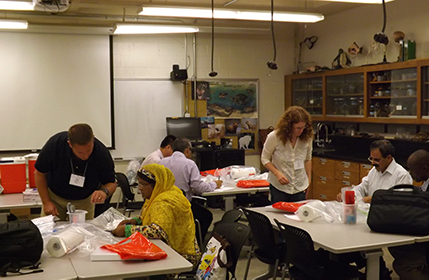Environmental Risk Assessment Workshop: Non-Target Organism Testing
-

June 23, 2014-June 27, 2014
8:00 am - 6:00 pmAmes, Iowa, USA
In June of 2013 and 2014, the Agriculture & Food Systems Institute, in cooperation with the Agricultural Research Service, United States Department of Agriculture, Iowa State University, and DuPont Pioneer, convened technical training workshops on non-target organism testing of transgenic crops. The purpose of the workshops was to provide regulatory scientists and environmental risk assessors with an experiential learning opportunity in laboratory and field testing of non-target organisms.
Using laboratory facilities provided by Iowa State University, workshop participants set up bioassays to assess the impacts of insect-resistant corn on corn earworm, the target pest, and on ladybird beetles, a beneficial non-target species. Three days later, participants returned to the lab to evaluate the bioassays, collect and compile their data, and draw conclusions.
As part of the workshop,
- Participants learned how insect populations are assessed in agroecosystems using two common insect collection techniques: sticky cards to collect flying insects and pitfall traps to collect ground-dwelling insects.
- Participants set up the traps in established fields of insect-resistant and traditional corn.
- Participants were given the opportunity to review and critique data generated by commercial laboratories, which are typically provided to government regulators in support of applications to authorize commercial planting of insect-resistant crops.
Outcomes
Participants were surveyed prior to the workshop to get a baseline of their knowledge and experience on the topics that would be presented during the five day program. Surveys were subsequently conducted four months and twelve months after the workshop in order to evaluate the longer term impact on participants’ professional development.
“The knowledge gained from this workshop will be helpful for me in planning and designing experiments related to environmental risk assessment of non-target organisms in transgenic crops for their environmental release. As an entomologist, my approach for non-target testing of genetically engineered plants for environmental risk assessment used to be from a research perspective, however, this workshop broadened my vision about what kind of data is necessary and needs to be generated, and how to look at the environmental risk assessment data on non-target organisms from the GE developer and regulator perspective, because of my experience with the evaluation of non-target organisms case studies.”
-Dr. Mukesh K. Dhillon, Senior Scientist, Division of Entomology, Indian Agricultural Research Institute, New Delhi
“Practical experience was gathered by the workshop participants while working the GM and non-GM corn fields by setting pitfall traps for ground dwelling and mobile arthropods as well as sticky traps for flying insects. I found it interesting that we have found more arthropods species in the GM field than in the non-GM field. This made the participants fully realize how specific Bt toxins are to their targeted insects only and gave firm confidence that GM crops are not harmful on NTOs. In addition to the lectures, labs and field works, participants reviewed a variety of proprietary studies submitted as part of regulatory dossiers and were asked to identify key information related to the risk assessment as well as to assess the quality of the studies, identifying strengths and weaknesses. This was both a useful and a successful activity.”
-Dr. Syed Nurul Alam, Head, Entomology Division, Bangladesh Agricultural Research Institute, Joydebpur, Gazipur
“We did not just talk about risk assessment, we ‘walked the talk’! Practical sessions formed the most important part of the training workshop. Empowered with this knowledge and the ‘power to do’, I am compelled to do this training with colleagues so that we build a team. But more importantly, I am working on starting to collaborate with the Commission of Science and the Department of Environmental Science in Malawi, to make environmental risk assessment an integral part of agricultural production. Soon, Malawi will be rolling out Bt cotton in most parts of the country. This training program came at the perfect time because a plan to initiate an environmental risk assessment on non-target organisms is inevitable.”
-Dr. Elizabeth Bandason, Lecturer, Entomology, Lilongwe University of Agriculture And Natural Resources, Bunda College Campus, Lilongwe, Malaw
